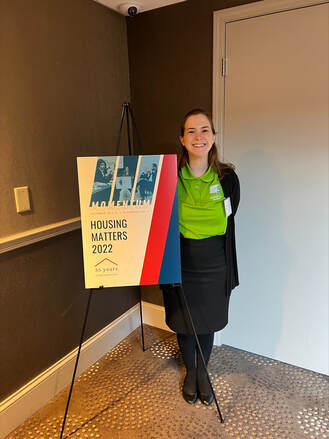 Last week I had the privilege of representing JOURNEYS at the Housing Matters Conference in Bloomington. This conference was held by Housing Action Illinois—a state-wide coalition of over 160 nonprofit, government, and corporate organizations dedicated to ending homelessness and expanding quality affordable housing throughout the state. This conference brought together over 200 individuals from the social services, financial, and government realms to learn from and share experiences. There was an array of diverse programming connecting various issues in housing instability with state-wide and community-focused solutions. Rates of chronic homelessness have increased across the state, and Continuums of Care (CoC) face challenges meeting the needs of their communities while themselves being supported. Homelessness is not a unique experience, and rural, suburban, and urban homelessness look different. To combat this, Governor Pritzker signed the Executive Order to Fight Homelessness in Illinois, which created the Illinois Interagency Task Force on Homelessness and The Community Advisory Council on Homelessness. The technical language boils down to “Home Illinois: Illinois’s Plan to Prevent and End Homelessness,” a 2-year collaborative plan focused on building affordable, supportive housing; bolstering the safety net; securing financial stability; and closing the mortality gap. While this plan cannot ensure that homelessness will never happen in Illinois, it can ensure that an individual’s housing insecurity will be “brief and one-time.” Another fascinating conversation centered on medical respite care—acute and post-acute care for people experiencing homelessness who are not ill enough to remain in a hospital but are also too ill to recover on the streets. Often, the unhoused are unable to access healthcare and face shorter lifespans and higher rates of illnesses compared to their housed peers. Housing is healthcare. Respite centers like The Boulevard, RISE Center of Cook County, and Sojourner House offer apartment-style quarters with private kitchens and bathrooms. These are not medical facilities, and they provide secure, dignified living arrangements so individuals can focus on healing and strengthening their physical and mental health for successful independent living. Because these individuals are often unhoused or at-risk of losing their homes, housing case managers and social workers coordinate with agencies to secure affordable housing and keep those at-risk in their homes; these providers also arrange clinical care, transportation, and other services for their clients. Overall, respite centers have proven to be cost-effective and tremendously beneficial; they truly are the future for providing quality services and eliminating health disparities for the unhoused. My experience at the Housing Matters Conference has left me with new knowledge and a renewed desire to connect JOURNEYS with a wider community of advocates. Through partnerships with other organizations in the coalition, JOURNEYS continues to grow, learn, and serve the unhoused and at-risk. Written by Amanda Stocchetti, Grant Associate
1 Comment
7/23/2024 07:38:13 am
Thanks for Nice and Informative Post. This article is really contains lot more information about This Topic.
Reply
Leave a Reply. |
MissionOur blog contains original writing on issues related to homelessness, community happenings, and unique agency stories. Archives
June 2023
Categories
All
|
|

 RSS Feed
RSS Feed

